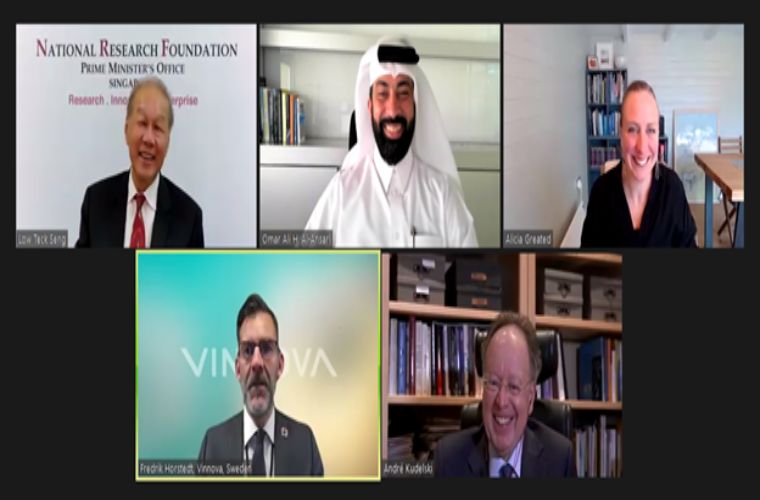Doha, Qatar - 6 November, 2021 - In its webinar titled, ‘Fostering Innovation Ecosystems: A Global Perspective,” QRDI Council hosted representatives from Singapore, Sweden, Switzerland and the UK to share perspectives on global innovation communities. All four countries have a place in the top 10 of the Global Innovation Index 2021, and three are in the top four. Moderated by Omar Ali Al-Ansari, Secretary General at QRDI Council, the discussion explored best practices and the importance of collaboration to develop a thriving innovation ecosystem.
The webinar saw contribution and insights by Professor Low Teck Seng, CEO of the National Research Foundation, Singapore; Dr Alicia Greated, CEO of KTN, UK; André Kudelski, President of Innosuisse, the Swiss Federal Agency for Innovation, and Vice-Chairman of the Swiss-American Chamber of Commerce; and Dr. Fredrik Hörstedt, Director for International Collaboration, Vinnova, Sweden.
“We need lots of different ideas to create great innovation.”
Focusing on the building blocks that work to develop a thriving innovation ecosystem, the panelists shared their perspectives. In her opening remarks, Dr. Greated emphasized that innovation must not only be measured in terms of economic impact, but on the impact on society and the environment at large. Furthermore, Dr. Greated spoke about the UK’s ecosystem as often being thought of as complex but that diversity is helpful because “we need lots of different ideas to create great innovation.” This diversity means that “you need to be working across government, business, academia…investors and the wider system.” In order to cut through the complexity of the ecosystem, Dr. Greated suggested that actors can rally around a common cause, noting the importance of “having really clear challenges that people are brought into.”
“[In Sweden], the main driver of innovation is the transition toward a sustainable society.”
Dr. Hörstedt echoed similar thoughts, saying that Sweden has three key success conditions that have built the country’s innovation ecosystem. These are i) being challenge-driven ii) working around societal sectors iii) taking on a multi-disciplinary approach. Dr. Hörstedt highlighted that a key innovation focus is the “transition toward a sustainable society.”
We must collaborate “to make a new idea real.”
From Mr. Kudelski’s perspective, Switzerland often uses a "bottom-up" approach to complement national activities, believing that a great idea might come from anywhere and that the ecosystem needs to be mobilised to realize that single idea. He said that different actors must collaborate "to make a new idea real." While new ideas are often associated with start-ups, a "balanced, open and extremely agile" philosophy is important whereby SMEs must not be overlooked and must be supported in their innovation journeys. Demonstrating the point on collaboration, Mr. Kudelski emphasized how the recent pandemic showed the inability for even the most powerful countries to solve a problem on their own.
Panelists agreed that innovation ecosystems are ultimately fueled by talent. Building on this, Professor Low Teck Seng highlighted that Singapore is focused on building talent, which sees a double-pronged effort to not only attract the best talent internationally, but to provide the right opportunities for the domestic population. Talent is then galvanized to seek solutions that not only address challenges held by industry but by the wider society. Rounding out the conversation on collaboration, Professor Seng emphasized that nations must move from being competitive to being collaborative, working across borders to tackle global challenges.
QRDI Council held the webinar as part of its efforts to bring together policy makers, industry experts and innovation thought leaders to discuss ideas that can transform innovation and scientific research landscapes. The event comes on the back of QRDI Council’s execution of the national research, development and innovation strategy, QRDI 2030 which works toward the country’s broader vision of an innovation and knowledge-based economy, as presented in QNV 2030. By convening international innovation experts and facilitating discussion, important insights can be learned and potentially applied toward the local innovation ecosystem.



